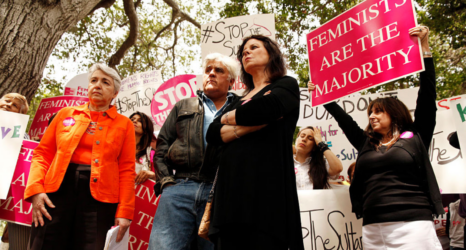Haitian feminist Yolette’s Jeanty‘s name may not ring a bell, but her tireless work has been rightfully recognized recently. As executive director of Kay Fanm (in Kreyol, House of Women)–an organization whose mission is to fight for social justice and women’s rights–Jeanty has been an advocate and supporter of women and girls for decades.
This past Tuesday, April 26, at the seventh annual Global Women’s Rights Awards, the Feminist Majority Foundation honored Jeanty and three other feminist activists, including Sunita Viswanath, founder of Women for Afghan Women; Renee Montagne, co-host of NPR’s Morning Edition; and Aung San Suu Kyi, Burma’s democracy movement leader and Nobel Peace Prize laureate.
The Eleanor Roosevelt Award, which these women received, is “given annually to a select few individuals who have contributed significantly–often against great odds and at great personal risk–to advance the rights of women and girls and to increase awareness of the injustices women face on account of their gender.” Past honorees include Laurie David, environmental crusader and producer of An Inconvenient Truth; Dolores Huerta, the human-rights activist and co-founder of the United Farm Workers; Jody Williams, coordinator of the International Campaign to Ban Landmines and a Nobel Peace Prize laureate; and Ms. magazine cofounder and feminist stalwart, Gloria Steinem.
At the event, co-chaired by Mavis and Jay Leno together with Eleanor Smeal, Jeanty spoke of the difficulty that small, women-led NGO’s such as Kay Fanm face. In the panel discussion that concluded the night’s activities, Kathy Spillar, executive editor of Ms. magazine and executive vice president of the Feminist Majority Foundation, pointedly asked Jeanty why so little, if any, of the billions of dollars raised for Haitian earthquake victims still has not reached grassroots organizations such as Kay Fanm.
Jeanty’s response revealed the complex interconnections between Haiti’s compromised sovereignty and the distribution of international funds, and how Haitians are thus impeded from playing a larger role in their own affairs:
Most of the money went to big NGOs or is being dispersed by the HIRC (Haiti International Reconstruction Committee) headed by Bill Clinton. Decisions are being made mostly by foreigners. [We have to deal with] 1) people who don’t think Haitian can do for ourselves, so they will do for us; 2) those who are there only to fill their pockets or 3) those with really good intentions who have no knowledge of the terrain. For the last year, Kay Fanm has been working to educate our foreign partners especially in the reality of life on the ground, and has asked them to put pressure on their governments to change the ways things are being done.
Serving as her translator, I had the opportunity to speak further with Jeanty. We discussed the delicate issue of the impact of media’s and even feminist reporting’s nearly solitary focus on gender-based violence and rape in Haiti. Indeed, in the last year, since the initial Madre report on rape in IDP camps in Haiti, this issue continues to garner tremendous attention. Jeanty is concerned that other persistent issues, such as battery and domestic violence–the percentage of which is higher than rape–has been marginalized. Since the quake, prostitution has also skyrocketed, yet remains undiscussed. Moreover, the structural, social, economic and political problems that undergird the tendency for violence also fall by the wayside. She said:
[In some ways], this attention is undoing our efforts. Work that we have done for years. Rape and gender-based violence existed well before the earthquake. It is not a new phenomenon. Whenever there is political turmoil, it is on the bodies of women that the battle is fought. In times of crises, it always increases everywhere. The situation for Haitian women is no different. … Worse, this emphasis hurts for the way that it represents Haitians solely as predators and victims.
This recognition could not arrive at a better time, bringing attention to Jeanty and the work of Kay Fanm. The organization has yet to recover from the serious setbacks endured in the earthquake, including the loss of founding members and allies as well as destruction of their property, which has yet to be rebuilt. Kay Fanm continues to struggle to offer shelter, along with medical and legal assistance, to girls and women in need.
In spite of the fact that Kay Fanm does not provide abortions, the organization also recently fell victim to the anti-abortion wave that threatens funding of women’s health across the world. Earlier this month, they lost the financial backing of Canada’s Development and Peace, which has supported them for the last 20 years. The Canadian organization bended under pressure from the Canadian Conference of Catholic Bishops, which has called for halting funds to organizations that are not pro-life.
Jeanty hopes this award will open doors for Kay Fanm in the U.S. to work in solidarity with new partners, especially other feminist organizations who are as determined to win the fight for women’s equal rights and empowerment.





